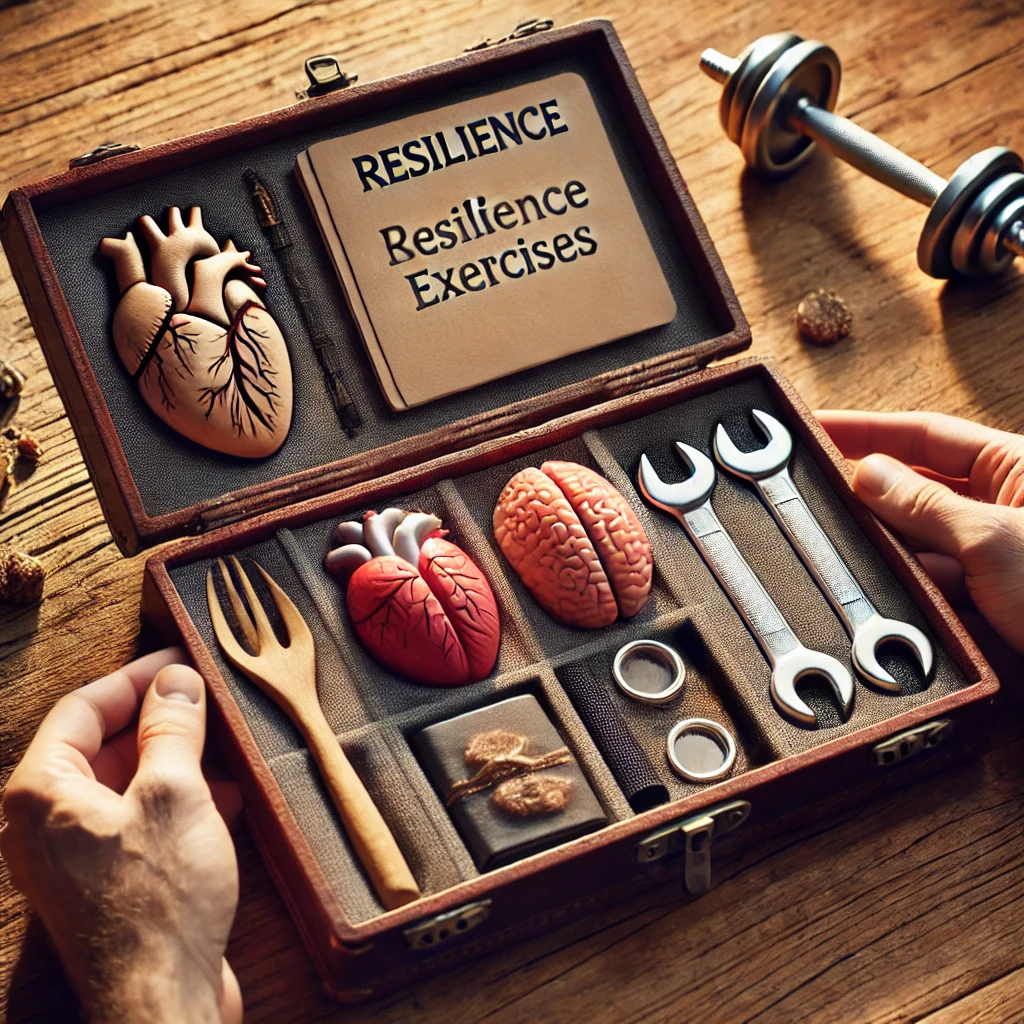Let’s face it – uncertainty isn’t just a buzzword anymore. It’s that knot in your stomach when you check the news, that 3 AM spiral wondering if you’re really ready for whatever comes next.
Sound familiar? You’re sitting there thinking, “Everyone else seems to have it figured out. They’re all building their emergency funds, mastering new skills, and planning for the future while I’m still trying to get through today without feeling overwhelmed.” Here’s the truth: they’re not, and you’re not alone in feeling this way. Not even close.
The world keeps throwing curveballs – political shake-ups, economic jolts, climate concerns, and that ever-present digital transformation that just won’t slow down. It’s enough to make anyone’s head spin. And you know what? It’s perfectly normal to feel unsteady right now.
But here’s the thing about emotional resilience – it’s not about becoming bulletproof. It’s about learning to bend without breaking, to flow with change instead of fighting it. In this guide, we’ll explore practical, no-nonsense strategies to build your resilience muscle, one step at a time. No guru-speak, no toxic positivity – just real tools for real people in real situations.
Let’s begin.
Kickstart Your Career: Essential Resilience Skills Every Young Professional Needs Now

As a young professional entering or navigating the workforce, it’s normal to feel anxious about job security and the pressure to prove yourself. Building emotional resilience can give you the mental strength to thrive, even when the unexpected happens. Let’s look at practical ways to develop resilience skills to help you stay grounded, focused, and prepared for anything.
1. Building Self-Confidence and Managing Expectations
- Setting realistic expectations is crucial when starting out. Many young professionals feel intense self-doubt, especially when things don’t go as planned. Start each day with an empowering affirmation, like “I am capable of growing and succeeding.” Affirmations may feel awkward at first, but repeated practice can genuinely build self-confidence.
- Practical Tip: Break down big goals into smaller, achievable tasks. This “small wins” approach not only boosts confidence but makes daunting projects more manageable. Completing each step provides a steady feeling of accomplishment.
2. Developing Coping Mechanisms for Rejection
- Rejections are part of any career journey but don’t have to define you. One of the best ways to build emotional resilience is to view rejections as learning opportunities. Keep a “Reflection Journal” where you jot down what you learned from each experience.
- Example: Write three positive takeaways after an interview that didn’t lead to a job offer. This might include recognizing a skill you’d like to develop or appreciating the experience as practice. Over time, this habit can shift your mindset, reducing the sting of rejection and reinforcing your resilience.
3. Setting Boundaries to Avoid Burnout
- As you build your career, it’s easy to fall into the trap of working overtime to prove yourself. However, neglecting self-care can lead to burnout, which weakens your mental resilience over time. Establishing clear boundaries can help you balance work-life demands and stay energized.
- Practical Tip: Set “no-work” hours daily and stick to them. Turn off notifications, step away from your devices, and use this time to recharge. A refreshed mind is essential for building resilience, and these daily breaks can help you perform better at work without overwhelming your mental health.
Each of these career resilience strategies offers a path to handling stress, adapting to change, and thriving as a young professional. By incorporating these practices, you’ll enhance your ability to handle challenges and cultivate a growth-oriented mindset for long-term success.
Reignite Your Career: Fast-Track Tips to Beat Burnout and Embrace New Paths

For mid-career professionals, burnout and career uncertainty are common struggles, especially during times of change. Building emotional resilience can help you overcome obstacles, adapt to industry shifts, and confidently create new career paths. Here’s how to boost resilience and regain momentum in your career.
1. Redefining Success and Embracing New Opportunities
- After years in a role or industry, feeling “stuck” or discouraged is easy. Embracing career resilience often means letting go of old definitions of success and opening yourself up to new possibilities. Begin by assessing what you truly value in your career today.
- Practical Tip: Reframe your goals to align with what excites and motivates you now. Consider exploring side projects, networking with professionals in different fields, or taking on a role that challenges you in new ways. Adjusting your mindset and seeking fresh experiences can re-energize your career while building adaptability.
2. Stress Management Techniques for High-Pressure Roles
- Stress is inevitable in demanding roles, but how you handle it makes all the difference. Incorporating stress management techniques into your daily routine can make high-pressure situations more manageable and support your mental well-being over time.
- Real-Time Strategy: Use the Pomodoro Technique—work for 25 minutes, then take a 5-minute break. These short, regular pauses reduce stress and keep your mind sharp. Try a short breathing exercise or meditation for deeper relaxation, which can help lower anxiety levels in just a few minutes.
3. Adapting to Industry Changes and Continuous Learning
- Continuous learning is essential for staying resilient amid rapid changes. Embrace a growth mindset by committing to regular skill-building activities, such as online courses, certifications, or webinars that keep you up-to-date in your field.
- Practical Tip: Dedicate at least one hour per week to professional development. This could be listening to an industry podcast, attending a virtual workshop, or reading a book related to your field. Not only will this help you adapt to industry changes, but it will also make you feel more capable and confident.
By redefining success, managing stress effectively, and committing to lifelong learning, you can refresh your career outlook and reduce burnout. These practices allow you to stay flexible and resourceful regardless of the challenges you encounter.
Stand Out in the Job Market: Resilience Techniques for New Grads to Thrive Right Now

Entering the workforce as a recent graduate can be daunting, especially in a competitive job market. Developing emotional resilience can help you handle the stresses and uncertainties of early career life. Here are some essential resilience-building techniques to support you as you make your mark.
1. Developing a Growth Mindset
- Facing setbacks, like a lack of response from job applications or not landing the “dream job” right away, can feel overwhelming. Adopting a growth mindset helps you see challenges as learning opportunities rather than failures.
- Practical Tip: Start a weekly reflection practice where you review a recent challenge and identify what you learned from it. For example, if an interview didn’t go as planned, list three skills or insights gained from the experience. This helps build career resilience and turns setbacks into valuable stepping stones.
2. Realistic Goal-Setting and Patience
- One of the biggest sources of stress for new graduates is the pressure to achieve immediate success. Setting realistic, gradual goals can alleviate this pressure, giving you a clear path forward while allowing time to adjust and grow.
- Real-Time Strategy: Create a structured job search schedule, limiting job application tasks to specific hours each day. Setting boundaries around your search can prevent burnout and energize you for future opportunities. Remember, progress doesn’t need to be overnight.
3. Stress-Relief Techniques for Mental Health
- Transitioning from student life to full-time work or job searching can be mentally taxing. Practicing stress-relief techniques like mindfulness and meditation can help you stay calm, focused, and emotionally resilient.
- Practical Tip: Use apps like Headspace or Calm for guided meditation sessions. Just a few minutes a day can make a difference in how you manage stress and maintain a positive outlook. These practices can also boost confidence and resilience as you build your career foundation.
You can better navigate the job market with confidence and resilience by fostering a growth mindset, setting achievable goals, and prioritizing mental health. Each of these strategies will help you handle the unique challenges of early career life, making you a stronger, more adaptable professional.
Stay Strong and Succeed: Resilience Tools Every Entrepreneur Needs to Handle Uncertainty

Entrepreneurs and freelancers often face unpredictable income, high demands, and limited support networks. Building emotional resilience is essential for staying motivated and navigating the pressures of self-employment. Here are key resilience tools tailored to help entrepreneurs stay grounded and successful.
1. Building Financial Resilience through Budgeting and Savings
- Financial unpredictability can be a major stressor. Developing financial resilience through budgeting and saving helps you weather income fluctuations and maintain stability. A safety net gives you the peace of mind to handle slower business periods or unexpected expenses.
- Practical Tip: Automate your savings by setting aside a fixed percentage of each payment you receive. Even setting aside a small amount consistently can build up over time and create a buffer for lean months.
2. Creating a Strong Support Network to Combat Isolation
- Entrepreneurship can be isolating, especially if you’re used to working within a team. Surrounding yourself with a supportive network—whether that’s peers, mentors, or online communities—can provide valuable guidance and reduce feelings of loneliness.
- Real-Time Strategy: Join industry-specific groups on LinkedIn or other networking platforms. Participating in group discussions or attending online meetups can help you feel more connected and give you a place to share challenges and advice with others who understand.
3. Managing Self-Doubt and Overcoming Perfectionism
- Entrepreneurs often face self-doubt and the pressure to perfect every aspect of their business. Learning to accept “good enough” instead of perfect allows you to make progress without burning out. Building emotional resilience also means forgiving yourself for inevitable mistakes and viewing them as learning experiences.
- Practical Tip: Start a “done list” to keep track of accomplishments instead of focusing only on tasks yet to be completed. This small shift in perspective helps you see your progress, which can counteract self-doubt and perfectionism.
Focusing on financial stability, building a support network, and practicing self-compassion can increase your resilience and adaptability as an entrepreneur. These habits empower you to face uncertainty confidently, keeping you motivated even when times are tough.
Bouncing Back with Grace: How to Turn Setbacks into Strength with Self-Compassion

Everyone faces setbacks, but how we respond to them can make all the difference. Practicing self-compassion is key to building emotional resilience because it allows us to learn from challenges without dwelling on self-criticism. Here are ways to cultivate self-compassion and turn setbacks into sources of strength.
1. Self-Compassion Journaling
- When things go wrong, it’s easy to spiral into negative self-talk. Instead, use self-compassion journaling to remind yourself of your worth. Imagine you’re writing to a friend who experienced the same setback and offer them kindness, understanding, and support.
- Practical Tip: After a difficult experience, write yourself a letter acknowledging what happened, how it made you feel, and what you can learn from it. This exercise shifts the focus from blaming yourself to treating yourself with empathy and understanding.
2. Practicing Positive Self-Talk
- Negative thoughts can hinder your resilience and make challenges seem bigger than they are. Replacing those thoughts with positive self-talk can help you regain control and stay motivated to keep moving forward.
- Real-Time Strategy: When you catch yourself in a negative thought, try replacing it with a balanced statement, like, “I’m learning from this experience” or “This is just a stepping stone on my path.” Over time, these small adjustments to your internal dialogue can build up your resilience and boost your confidence.
3. Reframing Failures as Learning Opportunities
- Viewing failures as opportunities to grow and improve is essential to building mental resilience. Instead of seeing a setback as the end, try reframing it as part of a larger journey toward success.
- Practical Tip: After each setback, ask yourself, “What can I learn from this?” Write down any skills, insights, or strengths you gained from the experience. Over time, this practice helps you see failures as necessary stepping stones that shape your path.
Practicing self-compassion can transform how you handle setbacks, turning them into moments of growth and learning. By journaling, using positive self-talk, and reframing failures, you’ll build the resilience to move forward with confidence and a kinder perspective.
Your Daily Guide to Resilience: Simple Habits to Boost Positivity and Handle Stress

Building resilience is a daily practice that can be strengthened through small, consistent habits. These habits boost positivity and make you better equipped to handle stress in uncertain times. Let’s explore daily resilience-boosting practices that anyone can incorporate into their routine.
1. Daily Resilience-Boosting Practices
- Starting each day with positive practices can set a resilient tone for whatever challenges come your way. Gratitude journaling is an effective way to focus on what’s going well, which naturally shifts your perspective to a more positive outlook.
- Practical Tip: Each morning, write down three things you’re grateful for, no matter how small. This practice builds emotional resilience by training your mind to focus on positives rather than stressors.
2. Letting Go of Control Over Uncertainty
- One of the most effective ways to reduce stress is to focus only on what you can control. Trying to manage every aspect of life, especially those beyond your influence, leads to burnout and frustration. Learning to accept uncertainty strengthens your resilience.
- Real-Time Strategy: When you’re feeling overwhelmed, list three things within your control and those that aren’t. This exercise helps you mentally let go of the uncontrollable and focus your energy on productive actions.
3. Cultivating Positivity and Growth-Oriented Thinking
- Practicing positivity and growth-oriented thinking doesn’t mean ignoring challenges; it means choosing to see them as chances to improve. Positive affirmations and reframing negative thoughts can shift your mindset and strengthen your resilience over time.
- Practical Tip: Use positive language in self-talk. Avoid phrases like “I can’t” and instead say, “I’ll try” or “I’m learning.” Small adjustments like these can shift your perspective and build a foundation for resilience.
By incorporating these simple resilience habits into your day, you’ll feel more grounded, positive, and prepared to face challenges. Practicing gratitude, focusing on controllable aspects, and maintaining a growth-oriented outlook will fortify your resilience one day at a time.
Ready-to-Use Resilience Toolkit: Proven Exercises to Strengthen Your Mindset Today

Building resilience doesn’t have to be complex. This Resilience Toolkit includes practical, ready-to-use exercises that can help you strengthen your mental resilience and handle life’s challenges with greater ease. Each exercise is designed to be simple yet powerful, making it easy to incorporate into your daily routine.
1. Cognitive Restructuring: Challenging Negative Thoughts
- Cognitive restructuring is a technique that involves identifying and reframing negative thoughts. You can reduce stress and reinforce a resilient mindset by questioning these thoughts and finding balanced perspectives.
- Exercise: When a negative thought arises, write it down and list any evidence for and against it. For example, if you think, “I’m not good at this,” challenge that thought with examples of times you’ve succeeded. Over time, this exercise helps you view situations with more balance and reduces negative self-talk.
2. Physical Well-Being as a Foundation for Mental Resilience
- Physical health and mental resilience are closely connected. Regular physical activity, even if it’s just a few minutes, can improve your mood and energy levels, making it easier to handle stress.
- Real-Time Tip: When you’re feeling overwhelmed, take a brisk 10-minute walk or do a quick stretching routine. Physical movement releases endorphins, which can boost your mood and help you reset. Small amounts of movement throughout the day supports physical and mental well-being.
3. Practicing Self-Compassion and Acceptance
- Being kind to yourself, especially during tough times, is crucial for resilience. Practicing self-compassion reduces the impact of negative events and helps you bounce back more quickly.
- Exercise: Write a letter to yourself as if you were speaking to a friend, expressing empathy and understanding. Address any challenges you’re facing and remind yourself of your strengths. This simple act of compassion can provide comfort and reinforce your resilience, helping you stay focused on growth.
By using this Resilience Toolkit, you have easy-to-implement exercises that strengthen your mindset. Whether it’s cognitive restructuring, staying physically active, or practicing self-compassion, these tools can help you stay resilient, no matter what life throws your way.
Self-Development for Lasting Resilience: Investing in Your Growth

Building emotional resilience isn’t just about handling life’s curveballs—it’s also about proactively strengthening yourself through self-development. By investing in personal growth, you create a foundation that makes you more adaptable, confident, and prepared to face challenges head-on. Let’s explore some key areas of self-development that directly enhance resilience and how to build them into your life.
1. Setting Personal Growth Goals
- Just as you would set career or fitness goals, developing resilience requires setting focused personal development goals. Think about areas in your life where growth would make you stronger and more balanced, like communication skills, time management, or emotional regulation.
- Practical Tip: Start by identifying one area you’d like to improve. Break it down into achievable steps, like completing a relevant online course or reading a book on the topic. These steps become tangible milestones that build your resilience and encourage continuous improvement.
2. Focusing on Growth-Oriented Skills for Resilience
- Skills like adaptability, emotional intelligence, and problem-solving aren’t just valuable in daily life—they’re key to staying resilient in any situation. Focusing on these growth areas helps you stay calm, open-minded, and resourceful when unexpected challenges arise.
- Growth Areas to Consider:
- Adaptability: Embrace change by challenging yourself to try new things regularly, like learning a new skill or adjusting to a new routine.
- Emotional Intelligence: Practice active listening and empathy in conversations to build deeper connections and manage interpersonal challenges with grace.
- Problem-Solving: Develop a habit of brainstorming multiple solutions to everyday problems, which makes you more agile in the face of larger obstacles.
3. Building a Structured Self-Development Plan
- Committing to self-development doesn’t have to be overwhelming. Creating a structured plan with small, actionable steps makes it manageable and motivating. Plan out weekly or monthly goals, and track your progress to maintain momentum.
- Real-Time Strategy: Set aside 15 minutes a day for personal growth activities, whether it’s reading a chapter of a book, journaling, or practicing a skill. These small, consistent actions build your resilience over time, making you stronger and more capable in handling life’s uncertainties.
Focusing on self-development as part of your resilience journey allows you to approach challenges with a growth mindset, constantly building and refining the skills that keep you grounded. Over time, this commitment to personal growth will not only enhance your resilience but also create a sense of accomplishment, purpose, and confidence in your ability to handle whatever comes next.
Read about the best self-improvement books in 2024 here.
Your Resilience Questions Answered: How to Build Mental Strength Even When It’s Hard
Building resilience can seem daunting, and it’s natural to have questions about the process. Here’s an FAQ section that addresses common concerns and challenges, providing clarity and encouragement to help you stay on track.
1. How long does it take to build resilience?
- Answer: Building resilience is a gradual process that varies for each person. Think of it as building muscle—you won’t see results overnight, but with consistent practice, you’ll notice increased strength over time. Starting with small, daily actions, like journaling or practicing mindfulness, can lead to noticeable growth in a few weeks.
2. What if I feel overwhelmed by these steps?
- Answer: If you’re feeling overwhelmed, begin with just one small step. For instance, try a simple gratitude practice or a 5-minute mindfulness exercise. Focusing on a single, manageable action can help reduce feelings of overwhelm and gradually build your resilience without adding stress.
3. How can I stay motivated when I don’t see immediate results?
- Answer: Resilience is a skill that strengthens with consistency. To stay motivated, track your progress, even if it’s small. Reflecting on any positive changes you’ve noticed—like improved mood or better stress management—can reinforce your commitment. Building resilience is a journey, and each small step contributes to long-term growth.
4. Are some people naturally more resilient than others?
- Answer: While some individuals may naturally have a resilient disposition, resilience is largely a learned skill. Anyone can develop resilience with the right strategies and mindset. By practicing techniques like self-compassion, positive self-talk, and setting boundaries, you can build your resilience regardless of your starting point.
This FAQ section is designed to reassure and guide you through the process of building resilience. Remember, resilience is a skill you develop over time, and even small steps can greatly impact your mental strength and well-being.
Your Path to Lasting Resilience: Small Steps Today for a Stronger Tomorrow
Building emotional resilience is a journey, one that can transform how you handle life’s challenges and uncertainties. By incorporating small, daily practices—like positive self-talk, gratitude journaling, and learning to reframe setbacks—you create a foundation of mental strength that grows over time. Each of the strategies shared in this guide, from handling career changes to managing self-doubt, can help you face uncertainty with confidence and optimism.
Remember, resilience is not about perfection; it’s about progress. Taking even one small step each day contributes to your overall mental well-being and your ability to bounce back from adversity. As you build your personal resilience toolkit, remember that these practices will serve you not only in difficult times but also in moments of growth and success.
Embrace this journey of resilience with patience and self-compassion. With consistency, these practices will become a natural part of your routine, equipping you with the strength to navigate whatever life brings. Keep moving forward, one step at a time, and celebrate every moment of growth along the way.